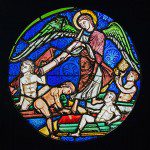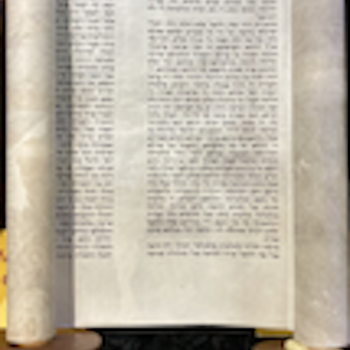 I love evangelist Billy Graham. For me, he was probably the greatest man of God in the twentieth century. I achieved one of my life goals in meeting this world-famous yet humble man. He spoke to our PGA Tour Bible Study multiple times. He even endorsed my first book, The Gospels Interwoven. In my new book, Solving the Samaritan Riddle: Peter’s Kingdom Keys Explain Early Spirit Baptism, I tell a story from my friendship with Billy, when I asked him what he thought of evangelist and faith-healer Oral Roberts.
I love evangelist Billy Graham. For me, he was probably the greatest man of God in the twentieth century. I achieved one of my life goals in meeting this world-famous yet humble man. He spoke to our PGA Tour Bible Study multiple times. He even endorsed my first book, The Gospels Interwoven. In my new book, Solving the Samaritan Riddle: Peter’s Kingdom Keys Explain Early Spirit Baptism, I tell a story from my friendship with Billy, when I asked him what he thought of evangelist and faith-healer Oral Roberts.
Today, ninety-seven year old Billy Graham has a new book entitled Where I Am: Heaven, Eternity and our Life Beyond. Although I haven’t read the book, he seems to lament in it about continuing to live on earth at his ripe old age when he could die and immediately go to heaven to be with Jesus. That’s what almost all Christiants believe–that when we die we then go to heaven to thereafter enjoy conscious bliss.
The early Christians did not believe that; rather, that teaching comes from Greek philosophy as Jewish New Testament scholar Alan Segal shows in his masterful book, Life After Death: A History of the Afterlife in Western Civilization (2004). I believed in “going to heaven when we die” until my mid-forties only because, as most Christians, that was what I was taught. Then I attended a convention in my hometown of metro-Houston that was about resurrection and thus afterlife as taught in the Bible.
Christianity Today magazine (October 15, 2015) reports about Billy Graham’s new book and says of him, “Just after his ninety-fifth birthday, Mr. Graham proclaimed with resolve, ‘When I die, tell others that I’ve gone to my Lord and Savior Jesus Christ – that’s where I am.'”
The main title of Billy’s book, Where I Am, comes from Jesus’ words said at the Last Supper. According only to the Gospel of John, Jesus said to his disciples, “In my Father’s house are many rooms. . . . I am going there to prepare a place for you. And if I go and prepare a place for you, I will come back and take you to be with me that you also may be where I am” (John 14.2-4 NIV herein unless otherwise noted).
How does Billy Graham apply Jesus’ words, “where I am”? He seems to think Jesus meant that when we die we will be with him in heaven. But that understanding divorces these words from their context. Jesus surely meant that he was going to go to his Father’s (=God’s) house in heaven–referring to his heavenly ascendion forty days after his resurrection–to prepare rooms there for his people. Then he said, “I will come back and take you to be with me.” Jesus, here, clearly refers to what almost all Christians have rightly called “the second coming of Christ,” which Billy Graham preached often in his career.
The second coming of Christ will be that future moment when Jesus literally will return from heaven to earth. He predicted this in his Olivet Discourse a few days prior (Matt. 24.30). And weeks later, when the resurrected Jesus ascended from Mt. Olivet into heaven, two angels appeared and announced to his disciples, “This same Jesus, who has been taken from you into heaven, will come back in the same way you have seen him go into heaven” (Acts 1.11).
Notice that Jesus meant his disciples would be “where I am” because they would be “with me.” And he said they would be “with him” right after he comes back, that is, at his second coming. But in Billy Graham’s new book, he takes Jesus’ words, “where I am,” out of this context and gives them another context, which is our death. With all due respect for Billy Graham, that is not what Jesus was saying here.
Billy says in this book, “death for the Christian is just the entryway to eternity, where the eternal God welcomes us in. The Bible says [actually Jesus said], ‘He who hears My word and believes in Him who sent Me has everlasting life, and shall not come into judgment, but has passed from death to life’ (John 5:24).” Jesus, here, surely means that when we truly believe in him we are promised eternal life, as if it is credited to our account. But Jesus did not mean that we experience such immortality then, or even upon death, but at the resurrection. For that is what he meant when he added, “a time is coming when all who are in their graves will hear his [Jesus’] voice and come out–those who have done good will rise to live, and those who have done evil will rise to be condemned” (vv. 28-29). This will happen at Jesus’ return.
Also according only to the Gospel of John, Jesus raised his friend Lazarus of Bethany from the dead (John 11.1-44). When Jesus arrived there at Bethany, Lazarus had been dead for four days. Jesus then said to his sister Martha, “‘Your brother will rise again.’ Martha answered, ‘I know he will rise again in the resurrection at the last day'” (vv. 23-24). Martha was right in saying this. She believed God’s people would live again at the resurrection, but not before. But Billy Graham says, “death for the Christian is just the entryway to eternity, where the eternal God welcomes us in,” meaning into our eternal home. That is not what Martha believed because it is incompatible with her scriptures, that is, our the Old Testament.
The Old Testament is full of information, more so than the New Testament, about what happens to the souls of all humans beings between their physical death and resurrection, what biblical scholars call “the intermediate state.” Wise King Solomon said, “the dead know nothing” (Ecclesiastes 9.5). He adds, “Whatever your hand finds to do, do with your might; for there is no work or thought or knowledge or wisdom in Sheol to which you are going” (v. 10 NRSV). So, there is no human consciousness during the intermediate state. But what did Solomon mean by Sheol? I have blogged about it multiple times.
The word Sheol occurs sixty-seven times in the Hebrew Bible (=Old Testament). Unfortunately, some English Bibles translate it “grave” or “pit” or the like. But Sheol is the name of a place, so that it should be transliterated rather than translated. Sheol in the Hebrew Bible corresponds to the Hades in the Greek New Testament. The Greeks generally believed as the Hebrews and many other ancients did, that when people die their souls go to a place in the underworld that Hebrews called Sheol and Greeks called Hades. Thus, despite Philippians 1.21-23 and 2 Corinthians 5. 1-8, the New Testament does not change this belief that is stated often in the Old Testament.
The common notion that when Christians die they go to heaven does not accord with the Old Testament. Moreover, it opposes it by making death, rather than resurrection, their hope. Jesus did not teach anything about the afterlife that differs from the Old Testament. The hope of the Old Testament is resurrection, not death (e.g., Job 19.25-26; Isaiah 25.8; 26.19; Daniel 12.2-3). The Apostle Paul called resurrection “the blessed hope” and that it will occur when Jesus returns (Titus 2.13).
So, when we Christians die and our souls go to Sheol, and we will be unconscious there until the heavenly trumpet blasts to awake us and we hear Jesus shout to us. Then we will arise with perfect resurection bodies and ascend to meet our Lord Jesus in the air. We will be “with him” and be where he is for all eternity. That is our Christian hope. That is what the world does not have. That is victory over death.
But Billy Graham always did get it right about how we can obtain the promise of eternal life. It is by believing that Jesus died for our sins on the cross and arose from the dead. Our hope in resurrection, and thus the promise to us of eternal life, was made possible by Jesus’ resurrection from the dead. Hallelujah!
[Also see the last post, on November 11, 2015, “Where Will the Righteous Go at the Resurrection?”]













